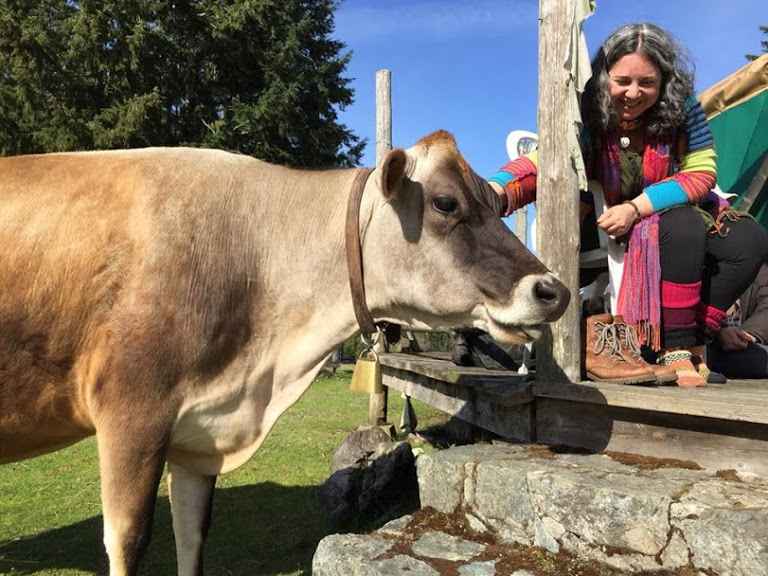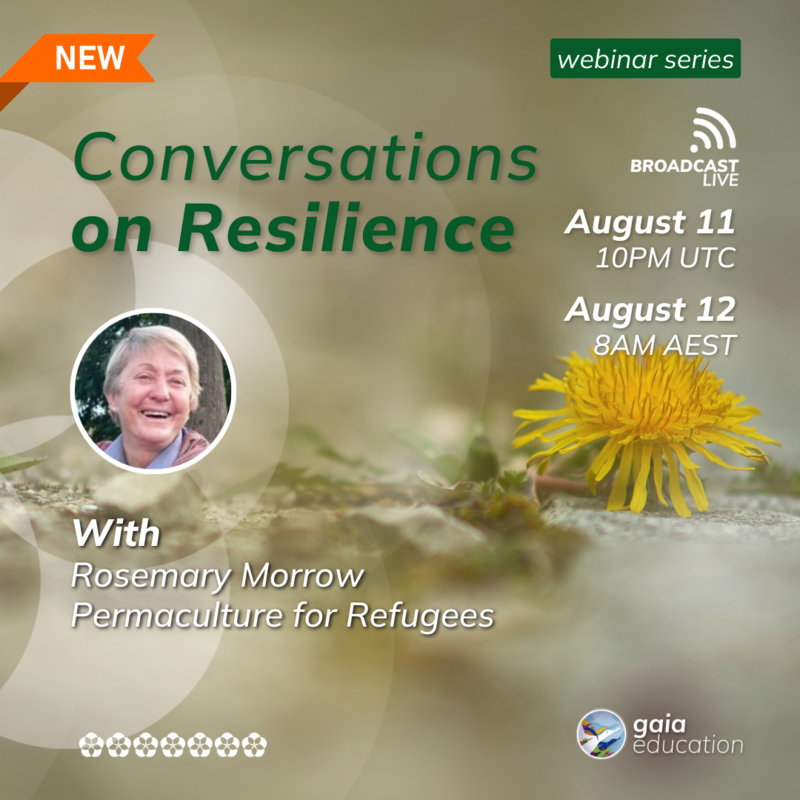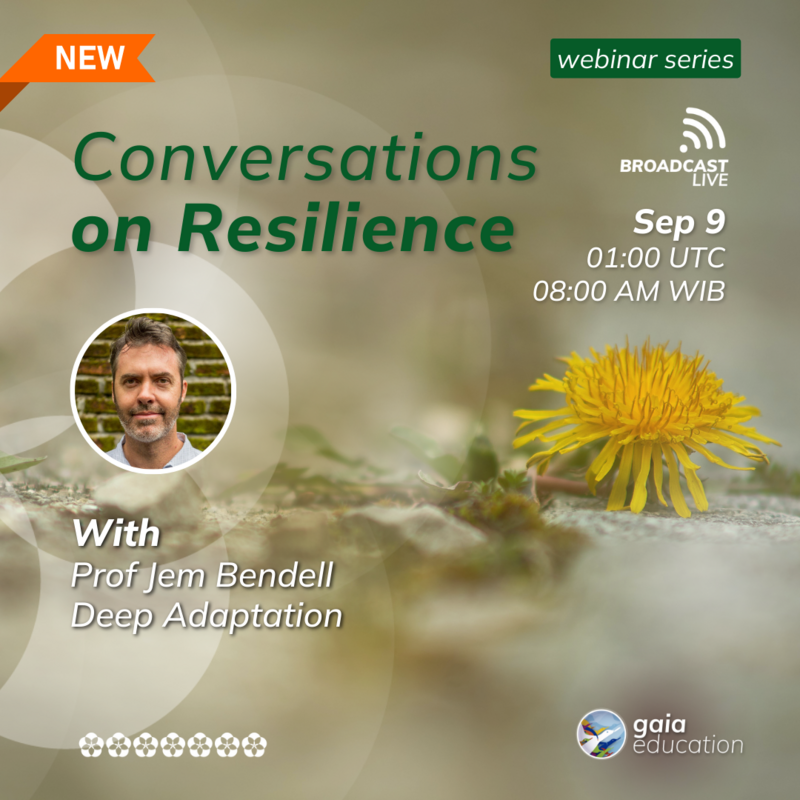Conversations on Resilience
Interviewing Bob Doppelt from Transformational Resilience
This webinar took place on July 14th, 2023.
Building Community Capacity to Prevent and Heal Climate Traumas
At Gaia Education, we want our participants to learn how to prepare and respond, becoming more resilient at the psychological (worldview), social, economic and ecological levels.
We believe that the best way to be resilient is by creating regenerative communities and households and cultivating regenerative livelihoods for all.
In this webinar series we are inviting speakers, activists and authors who have been researching, documenting, working and teaching about resilience in communities.
Transformational Resilience
By Bob Doppelt, Coordinator, International Transformational Resilience Coalition (ITRC)
This presentation will describe the urgent need, methods, and benefits of using a public health approach in communities to build population mental wellness and transformational resilience to prevent and heal climate change-generated psychological and emotional struggles as residents also engage in solutions to the climate crisis. The information presented is the result of an intensive 2+ year international research project that is described in Bob Doppelt’s new book Preventing and Healing Climate Traumas: A Guide to Building Resilience and Hope in Communities (Routledge Publishing). During the presentation Bob will also describe how the “Community Mental Wellness and Resilience Act of 2023” that has been introduced in the US Congress would fund and support the community initiatives.
Participants will learn:
- How the relentless toxic stresses, emergencies, and disasters generated by the climate emergency are producing widespread individual, community, and societal traumas that left unaddressed will undermine individual and collective mental health, physical health, safety, security, and wellbeing, and also block solutions to the climate emergency.
- The results of the ITRC’s extensive 2+ year research project that determined that, to prevent and heal widespread climate traumas, a public health approach is needed in communities to build population (or universal) mental wellness and transformational resilience. This means strengthening the capacity of all residents to respond constructively and use adversities as transformational catalysts to generate new positive sources of meaning, purpose, hope, and courage in life.
- The core principles and 5 foundational elements involved with using a public health approach in communities to build population mental wellness and transformational resilience for the climate crisis.
- Examples of communities using this approach and the many benefits they have achieved.
- The key roles mental health, social service, disaster management, climate mitigation and adaptation, and other professionals can play in community mental wellness and resilience building initiatives.
Bob Doppelt
Bob Doppelt founded and coordinates the International Transformational Resilience Coalition (ITRC), a network of mental health, social service, disaster management, climate, and faith organizations and professionals (website: http://itrcoalitionorg). He is trained in both counseling psychology and environmental science and has combined the two fields throughout his career. He is also a Graduate of the International Program on the Management of Sustainability, in Ziest, The Netherlands, a Mindfulness-Based Stress Reduction (MBSR) Instructor. He is also a former Fellow at the Rockefeller Foundation’s Bellagio Center.
Early in his career Bob worked as a counselor with troubled youth and their families. Decades later he directed the Climate Leadership Initiative at the University of Oregon, a climate change research and technical assistance program that was one of the first in the U.S. to assist private and public entities to develop climate mitigation and adaptation plans. For many years he also taught systems thinking and climate change policy at the university. Through this work Bob realized that the mental health and psycho-social-spiritual impacts of the climate crisis were a significant but largely unaddressed problem. This led him in 2013 to organize the ITRC. Due to his many years of work, in 2015 Bob was named one the world’s “50 Most Talented Social Innovators” by the World CRS Congress.
Bob is the author of a number of books on the interface between individual and community mental health, social change, and ecological regeneration.
His newest book Preventing and Healing Climate Traumas: A Guide for Building Resilience and Hope in Communities by Taylor and Francis/Routledge Publishing. It describes the outcomes of an intensive two+ year research project that determined that a public health approach to mental health is necessary to prevent and heal the accelerating individual, community, and societal traumas generated by the global climate mega-emergency. This involves returning the responsibility for sustaining mental wellness and resilience to where it existed for most of human history and has the greatest chances of success: to the neighborhood and community levels.
Transformational Resilience: How Building a Culture of Human Resilience Can Safeguard Society and Increase Wellbeing (Greenleaf Publishing 2016) describes how climate disasters and toxic stresses affect individual and collective health and wellbeing, and methods to build human resilience at the personal, organizational, and community levels to prevent widespread harm and increase wellbeing. Shortly after publication it was called “My go to book for hope” by journalist Marc Bekoff in Psychology Today.
From Me to We: The Five Transformative Commitments Required to Rescue the Planet, Your Organization, and Your Life (Greenleaf Publishing, 2012) describes five key principles that organizations and individuals can adopt to direct them on a path toward true ecological and social sustainability and restoration.
The Power of Sustainable Thinking: How to Create a Positive Future for the Climate, The Planet and Your Life (Earthscan Publishing, 2008) describes how individuals can examine and adjust their core assumptions and beliefs--their mental models-- to think and act in ways that enhance personal, social, and ecological well-being. In the summer of 2010 this book was deemed by Audubon Magazine to be one of the “eleven most important books on climate change.”
Leading Change Toward Sustainability: A Change Management Guide for Business, Government, and Civil Society (Greenleaf Publishing, 2003) describes a systems-based approach to organizational change that can move public and private organizations toward true ecological sustainability. Just six months after it was released the book was deemed one of the "ten most important publications in sustainability" by a GlobeScan survey of international sustainability experts.
Host
Silvia Di Blasio
Silvia is Gaia Education academic and eLearning coordinator. She also co-facilitates the Worldview Dimension of the GEDS in Spanish, the Cultivating Regenerative Livelihoods course and the Design for Resilience course. Silvia holds a certificate in permaculture, a certificate in disaster management and is a Gaia Education certified trainer. She has experience in various fields and has years of experience in community resilience and related fields.
Books by Bob Doppelt
(You can get 20% off his new book when you register to our webinar)
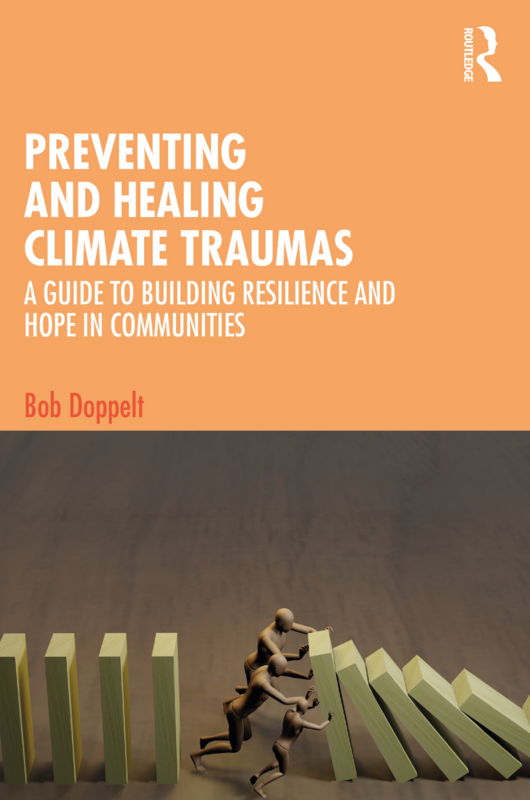
Preventing and Healing Climate Traumas: A Guide to Building Resilience and Hope in Communities
Using extensive research, interviews with program leaders, and examples, Preventing and Healing Climate Traumas is a step-by-step guide for organizing community-based, culturally tailored, population-level mental wellness and resilience-building initiatives to prevent and heal individual and collective climate traumas.
This book describes how to use a public health approach to build universal capacity for mental wellness and transformational resilience by engaging community members in building robust social support networks, making a just transition by regenerating local physical/built, economic, and ecological systems, learning how trauma and toxic stress can affect their body, mind, and emotions as well as age and culturally tailored mental wellness and resilience skills, and organizing group and community-minded events that help residents heal their traumas. These actions build community cohesion and efficacy as residents also engage in solutions to the climate emergency.
This book is essential reading for grassroots, civic, non-profit, private, and public sector mental health, human services, disaster management, climate, faith, education, and other professionals, as well as members of the public concerned about these issues. Readers will come away from this book with practical methods based on real-world examples that they can use to organize and facilitate community-based initiatives that prevent and heal mental health and psycho-social-spiritual problems and reduce contributions to the climate crisis.
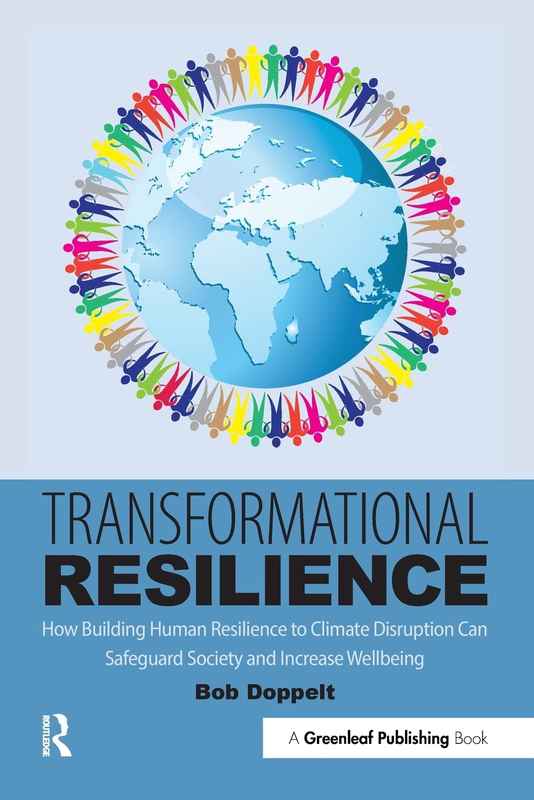
Transformational Resilience: How Building Human Resilience to Climate Disruption Can Safeguard Society and Increase Wellbeing
This book calls for a rapid expansion of efforts to address the climate crisis beyond emission reductions and adapting physical infarstructure and natural resources to include a third major focus: bulding the capacity of individuals and groups to cope with and use the adversities generated by climate change as catalysts to learn, grow and flourish. The book also calls on mental health, public health, emergency response, education, and faith leaders to expand beyond post crisis-treatment to emphasize building preventative personal and psychosocial resilience skills.
Failure to proactively build human capacity to deal constructively with the harmful mental health and psychosocial impacts of climate disruption will seriously impair the safety and health of individuals and families. It will also threaten the security and social wellbeing of organizations, communities, and entire societies for generations to come. Just as important, the failure to build personal and psychosocial resilience threatens to delay or completely block efforts to cut carbon emissions, adapt to warming, and reduce the climate crisis to manageable levels.
Doppelt begins by describing how natural human psychobiological reactions to the traumas and toxic stresses generated by climate disruption damage the psychological, emotional, and social wellbeing of individuals, organizations, communities and whole societies. Using numerous examples, including his own organization's Transformational Resilience program, Doppelt describes methods and skills that may be used to build capacity within all levels of societies to avoid self- and socially harmful reactions and use the traumas of climate change as catalysts to find new meaning, direction, and hope in life. This book applies an important new perspective to the question of how to successfully respond to climate change.
Next webinars
Register now!
Rosemary Morrow
From Permaculture for Refugees
Jem Bendell
From Deep Adaptation



